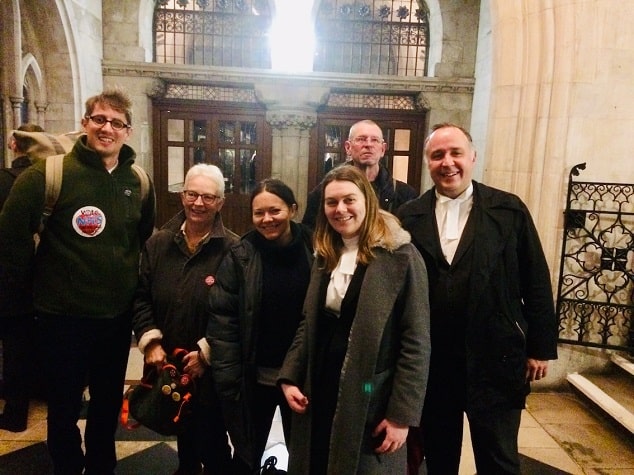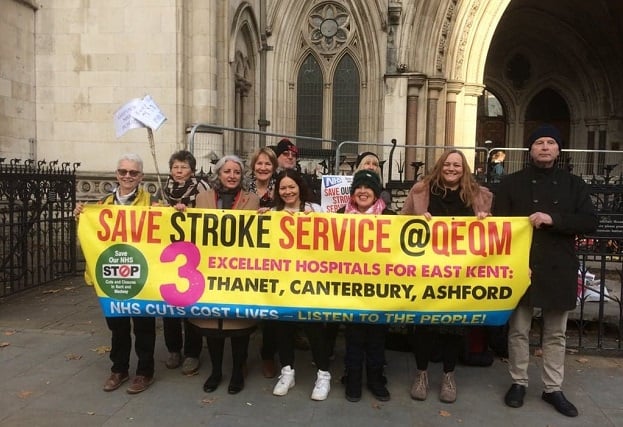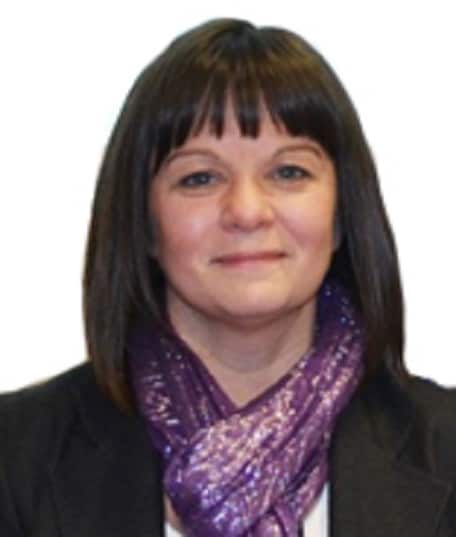
A judicial review challenging a decision to close acute stroke services in hospitals including Margate’s QEQM has failed.
Two Thanet groups, Save Our NHS in Thanet and Thanet Stroke Campaign, took a case to the High Court – alongside Medway Council- to fight the decision made by a Joint Committee of Clinical Commissioning Groups’ (JCCCG) to remove acute services from six hospitals in favour of three specialised units for Kent and Medway.
The cases were heard together by Judge Judith Farbey although they were brought on behalf of separate claimants.
A decision on the location for three hyper-acute stroke units (HASUs) across Kent & Medway was agreed by the Joint Committee of Clinical Commissioning Groups (JCCCG) last February.
The HASUs will be at Darent Valley Hospital, Maidstone Hospital and William Harvey Hospital. Acute services at Margate’s QEQM Hospital will be removed with Thanet patients needing to travel to Ashford instead.

SONIK and Thanet resident Marion Kepple, who was the claimant for the Thanet Stroke Campaign backed by Cllr Karen Constantine and Summer Kitchen boss Sharon Goodyer, challenged that decision.
Today the court judgement reveals that challenge has been rejected. The judicial review process has two stages: permission, where the judge decides if there are grounds for a review, and then the review itself if permission is granted. The case presented to the court was based on eight grounds against the NHS.
The judge denied permission for six of the eight grounds because they did not meet the legal requirements for judicial review. The judge did grant permission for a judicial review on the remaining two grounds. After considering the legal arguments the judge dismissed the claims.
SONIK says the rejection will not stop the battle to retain services at QEQM.
Carly Jeffrey of Save Our NHS In Kent, said: “This verdict is a setback but it will not stop us from fighting on. We are considering an appeal and will be gathering outside the QEQM hospital tomorrow (Saturday) at 11am to discuss next steps with our supporters – all are welcome.
“We will be calling for effective measures to be put in place so that we can see a true picture of the before and after impact of these plans being implemented. Surprisingly, this end-to-end data isn’t recorded currently. It should be tracked from emergency call to outcome, and should apply to all changes in acute services – not only stroke, but also A&E and maternity, which are due to be reconfigured next.

“We are devastated by the result and what it means for our residents and our hospital. However, there is one more hurdle remaining before the plans can be implemented. We are still awaiting a response from the Health Secretary Matt Hancock, on the stroke plans. The IRP (Independent Reconfiguration Panel) reviewed the information from Medway Council (which opposes the plans) at the end of last year. This is now sitting on Hancock’s desk, awaiting action from him. It will be interesting to see if he waves the plans through or halts them. It is in his power to stop these hospital units being closed.”

Save Our NHS in Kent have criticised Susan Acott, the Chief Executive of East Kent Hospitals Trust (EKHUFT) for her part in the decision to close services at QEQM in Margate. A SONiK spokesperson said “It was the Trust’s unwillingness to continue running two urgent stroke units that put QEQM out of the running. That choice, coming from the leader of EKHUFT, meant that no Thanet option existed in the public consultation. They must shoulder a large portion of the blame for this.”
Cllr Constantine said she was “profoundly disappointed at the negative outcome.”

She added: “We needed the stroke unit to be kept in Thanet. Ashford is too far. This decision leaves us with a bleak outlook. I think the people of Thanet are repeatedly being let down.
“During the three day hearing in December last year, the judge expressed concern that women in Thanet die 20 years earlier than elsewhere in Kent. I believe this life expectancy gap is due to the poor health outcomes, poorer employment, poorer education and generally a lower standard of living than elsewhere in Kent and the generally wealthy South East. This was an opportunity to at least attempt to improve life expectancy for Thanet people, an opportunity to ‘level up’ across the county. It is an opportunity lost.
“This outcome will set Thanet at a disadvantage for a long time to come. The good stroke clinicians we have working locally will want to look elsewhere for employment. It will no doubt put people off moving to our area.
“As the County Councillor with responsibility for health, I have done my very best to fight against this on residents behalf. I have spoken out and challenged this at every step of the way over the past few years at the many committee meetings. I got the first Judicial Review underway. I am so grateful to our community client Marion Keppel. She has fought so hard to get the right outcome, as have Medway and SONIK. I’m also grateful to Sharon Goodyer and our lawyer Alex Rook.
“The recent scandal regarding EKHFT maternity services is also gravely concerning. It seems to me that our healthcare is falling apart. Residents can’t get GP appointments, A&E is regularly overflowing, Stroke cases will now be treated in Ashford. The significant concerns regarding our maternity services , along with the budget deficit all lead me to conclude that QEQM should be placed back into special measures. We need a thorough, detailed, clinically led, technical assessment of the systemic failures in Thanet’s health care and the impact on our population.
“I take my hat off, to the loyal, hard working and dedicated staff who are doing their best under such challenging circumstances.”
Marion said she was upset by the outcome, adding: “We didn’t get a fair hearing. We deserve better health care because we need it more here, Thanet is becoming like a Third World.”

Speaking about the ruling, Rachel Jones, Senior Responsible Officer for the Stroke Review said: “We are extremely pleased that the judge’s ruling means that we can improve stroke care and outcomes for local people.
“Our review of urgent stroke services, which started back in late 2014, has always been about providing the highest quality stroke care for patients and certainty for our hard-working staff.
“Evidence from other parts of the country, and from around the world, shows that this new way of providing stroke care reduces death and disability from stroke. Our focus now will be on implementing the new stroke units as soon as possible so we can deliver much-needed improvements.
“We understand the claimants will be disappointed by this outcome and we are committed to continuing to work with local communities where there are concerns about the impact of the changes.”
The NHS in Kent and Medway is awaiting the outcome of the referral to the Secretary of State and the subsequent Independent Reconfiguration Panel review of the stroke programme, which it hopes to receive in the near future.
Until then, the NHS will work on developing a timeline for implementing the new hyper acute stroke units and will publish further information on likely go-live dates for the HASUs as soon as possible after the outcome of the Secretary of State referral is known.
Kent and Medway stroke consultants say larger, specialist units in other parts of the country have been shown to improve outcomes for people who have had a stroke and combining staff and resources into three hyper acute units, able to run 24 hours a day, seven days a week, will allow top quality care for stroke patients.
The review process has been led by stroke consultants, stroke nurses and other stroke specialist health professionals.
Hyper-acute units plan
The units will be at Darent Valley Hospital, Maidstone Hospital and William Harvey Hospital
The plan is for Darent Valley to have a 34 bed unit, Maidstone General Hospital 38 beds and William Harvey Hospital 52 beds. There will also be a two bed outflow at Eastbourne General Hospital.
The JCCCG expected the hyper-acute units at Darent Valley and Maidstone to go live in March 2020 followed by the William Harvey Hospital in spring 2021. This was then set back t to Darent Valley Hospital and Maidstone Hospital to open in April 2021 and the William Harvey Hospital to open in autumn of 2022.
To house the new unit at William Harvey Hospital will require a new build 32 bed ward, linked to the existing stroke ward to create a single unit was estimated at £20.9million.
Currently for east Kent there are 24 stroke beds at WHH, 22 at QEQM and 24 at K&CH.
The new units are expected to reduce financial deficits in the Kent and Medway service, although a review of those finances will take place.
Costs for the complete reconfiguration of east Kent hospital services, including the option of creating a major emergency centre with specialist services at William Harvey Hospital, are estimated at £351million. Costs for a new build hospital in Canterbury will be approximately £363million.
Points in the case
Of the grounds put forward by SONIK, two were judged to be ‘arguable’: one, that the changes do not do enough to reduce inequalities, as CCGs are bound by the NHS to do; and two, that the consultation was ‘unlawful’ due to the way it was carried out. All of the grounds from each of the three cases were ‘dismissed’, meaning that all three cases lost. However, the fact that two points were deemed arguable may be the basis of an appeal.
One of the sticking points was whether or not the CCGs (NHS commissioners) had considered inequalities and levels of deprivation in certain areas when making their decision. The SONiK/ Leigh Day case argued that they had not, but the judge disagreed.
The extent to which Thanet is a deprived area was another point raised. The judge viewed Thanet as one area of deprivation among many in the region, whereas, looking at the multiple factors of deprivation Thanet is the second most deprived are in all of the South East.
SONIK said the endorsement from Professor Antony Rudd, who is the NHS’s National Lead for Stroke, was limited to the plan at a national level, and gave no endorsement to the specifics of the Kent and Medway rollout. The Judge disagreed.
The judge agreed with the NHS commissioners that “they had built public involvement into their decision making process” and therefore that their duty to consult was met. SONIK said the consultation was marred by cherry-picking of public participants, omission of key information and stifling challenge.

